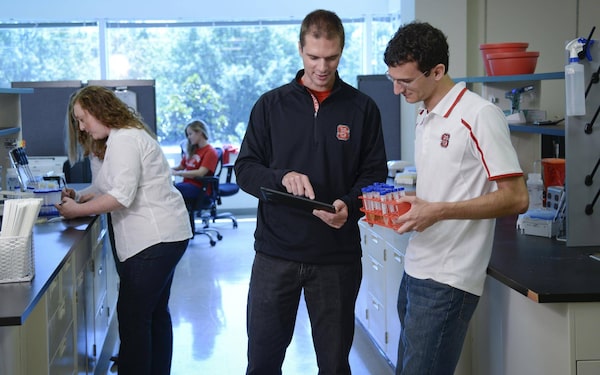
Rodolphe Barrangou in the CRISPR lab on Centennial campus at North Carolina State University.Marc Hall
Rodolphe Barrangou has a dual perspective on the biggest biological breakthrough to come along in a generation.
As a scientist who spent a decade in the food industry before taking up his current position at North Carolina State University, he helped to discover CRISPR (pronounced "crisper"), the acronym for a natural molecular defensive system that bacteria use to chop up invading viruses. Other scientists quickly picked up on that finding and repurposed CRISPR as a gene-editing tool that can be deployed to alter the genome of virtually any species, including humans. While this has raised the spectre of designer babies, the biotech industry is moving to exploit CRISPR for a range of applications from cancer research to food crops to targeted antibiotics.
As an MBA and an entrepreneur, Mr. Barrangou has launched four companies based on the CRISPR technology. When he was in Toronto recently for the presentation of the Gairdner Awards (Canada's most prestigious international science prize) he met up with Globe and Mail science reporter Ivan Semeniuk to share his thoughts on the collision of science and business and the birth of what is expected to become a multibillion-dollar industry.
How has the CRISPR field changed since you got into it?
When we first published on the subject in 2007, there were 27 scientific papers out on CRISPR. Now, this year alone, there will likely be about 4,000 papers published. The materials for using CRISPR have been shipped to 24,000 labs in 61 countries. It's like a mountain that we're climbing. After just a few years, we've got a great view but there's still a long way to go. That's the true sign of a transformative tech revolution.
How is CRISPR affecting people in daily life?
Wherever you live in the world, people are consuming CRISPR-enhanced foods – at least if you eat yogurt or cheese. Milk, as a primary source of human nutrition, has a short life span. Long ago, people discovered that milk could be preserved through fermentation and turned into yogurt and cheese – basically, using bacteria to turn lactose into lactic acid. Inconveniently, milk is not sterile. It is heavily populated by viruses that can kill bacteria and spoil the fermented product. For years, industry has been exposing bacterial cultures to viruses in hopes of finding a few that are resistant to infection. We now know that CRISPR is part of that equation. Based on that knowledge, you can create super-robust bacterial strains, and since 2011 those strains have been commercialized and they account for virtually 100 per cent of cultures sold to the dairy industry.
What about the business prospects of using CRISPR more directly to engineer organisms for commercial use in food and health therapeutics?
The CRISPR revolution has moved from the lab to the boardroom. If you work on anything that is driven by genetics, you have to have a CRISPR play. You have to find a partner that's going to work with you or build your own strategy and hope you get a piece of it.
The use of CRISPR for gene editing is currently the subject of an intellectual-property battle in the United States. What does that mean for others looking to launch startups that depend on CRISPR?
I think people understand that the IP situation is not going to get worked out any time soon. There may not be one victor of them all. You have to be mindful of IP, you have to have legal advice, you have to make deals, but you have to jump in because if you don't you'll be left behind. The Davids of CRISPR shalt not fear the Goliaths of CRISPR. They have to take a shot, not to kill the giants, but down the road to create a strategic alliance with them.
How do you feel about the IP situation?
Imagine looking in the window of a French bakery and instead of focusing on the bread, or the croissants or the tarts, you realize you may own the use of flour in a heating device. CRISPR will be worth billions to pharma, so it's clear that the players involved are going to spend millions on the IP dispute. But it's not a good story for science.
What about the food industry? Is it possible that CRISPR-enhanced foods will face the same negative perceptions as GMO crops?
With CRISPR, you can take an allele – of corn say – that's been lost as a commercial crop and bring it back to life. That's not GMO in many regions of the world and it shouldn't be. The biggest hurdle is the lack of public understanding of science. As a food scientist, my job is to feed the world healthier foods. We're doing CRISPR in cassava, we're going to do it in banana, and again citrus disease. And that's why the next green revolution – a CRISPR-fuelled revolution – is going to have a bigger impact than CRISPR therapeutics in the short term.
What's your message for entrepreneurs and investors looking at the CRISPR domain?
If you want to be a leader, the window is still open but it's closing.
This interview has been edited and condensed.
 Ivan Semeniuk
Ivan Semeniuk